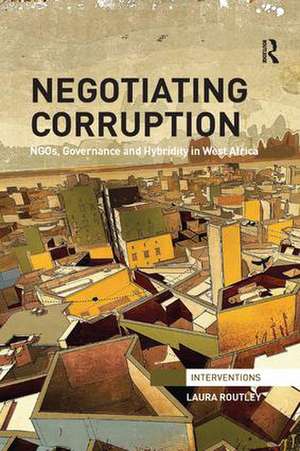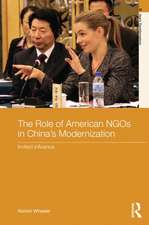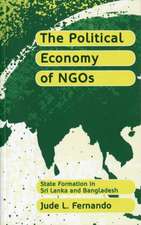Negotiating Corruption: NGOs, Governance and Hybridity in West Africa: Interventions
Autor Laura Routleyen Limba Engleză Paperback – 16 iun 2017
NGOs are characterised as intermediaries between the local and the international, and between the state and the population. In both of these roles they are understood to reform governance by bringing about changes in culture and instituting bureaucratic norms. They have, therefore, been seen as part of the apparatus of a global liberal governmentality. This book complicates this portrayal and highlights the ambiguous role of liberal governmentality through an exploration of the 'grey practices' of the NGOs studied. These practices are 'grey' as they do not fit the pattern of virtuous NGOs holding the state to account described in development policy, yet at the same time they ensure that the state produces the outcomes that a fully-functioning state ought to. This enacting of oppositional and antagonistic elements is further unpacked in conversation with Homi Bhabha's concepts of negotiation and hybridity.
Negotiating Corruption draws attention to both the limitations of current explanations of corruption in Africa and the problematic way in which they are framed. The book's detailed engagement with understandings of corruption within policy and academic debates will make it a useful resource for undergraduate teaching. It will also be of keen interest to researchers, academics, and postgraduate students who engage with the issues of corruption, NGOs, civil society, African politics, governmentality, and hybridity.
| Toate formatele și edițiile | Preț | Express |
|---|---|---|
| Paperback (1) | 241.15 lei 6-8 săpt. | |
| Taylor & Francis – 16 iun 2017 | 241.15 lei 6-8 săpt. | |
| Hardback (1) | 1110.77 lei 6-8 săpt. | |
| Taylor & Francis – 8 dec 2015 | 1110.77 lei 6-8 săpt. |
Din seria Interventions
-
 Preț: 297.79 lei
Preț: 297.79 lei -
 Preț: 310.65 lei
Preț: 310.65 lei -
 Preț: 309.41 lei
Preț: 309.41 lei -
 Preț: 319.01 lei
Preț: 319.01 lei -
 Preț: 327.40 lei
Preț: 327.40 lei -
 Preț: 156.44 lei
Preț: 156.44 lei -
 Preț: 128.80 lei
Preț: 128.80 lei - 9%
 Preț: 1041.01 lei
Preț: 1041.01 lei -
 Preț: 112.30 lei
Preț: 112.30 lei -
 Preț: 123.84 lei
Preț: 123.84 lei -
 Preț: 302.17 lei
Preț: 302.17 lei -
 Preț: 286.66 lei
Preț: 286.66 lei -
 Preț: 309.65 lei
Preț: 309.65 lei -
 Preț: 111.26 lei
Preț: 111.26 lei -
 Preț: 312.36 lei
Preț: 312.36 lei -
 Preț: 309.70 lei
Preț: 309.70 lei -
 Preț: 311.48 lei
Preț: 311.48 lei -
 Preț: 379.30 lei
Preț: 379.30 lei -
 Preț: 279.25 lei
Preț: 279.25 lei -
 Preț: 189.29 lei
Preț: 189.29 lei -
 Preț: 303.01 lei
Preț: 303.01 lei -
 Preț: 342.07 lei
Preț: 342.07 lei -
 Preț: 443.86 lei
Preț: 443.86 lei - 18%
 Preț: 1055.06 lei
Preț: 1055.06 lei - 18%
 Preț: 999.51 lei
Preț: 999.51 lei - 25%
 Preț: 880.72 lei
Preț: 880.72 lei - 18%
 Preț: 1057.05 lei
Preț: 1057.05 lei - 18%
 Preț: 1001.90 lei
Preț: 1001.90 lei -
 Preț: 411.42 lei
Preț: 411.42 lei - 18%
 Preț: 1005.04 lei
Preț: 1005.04 lei - 18%
 Preț: 703.61 lei
Preț: 703.61 lei - 18%
 Preț: 1108.73 lei
Preț: 1108.73 lei - 18%
 Preț: 699.96 lei
Preț: 699.96 lei - 18%
 Preț: 1005.04 lei
Preț: 1005.04 lei -
 Preț: 409.69 lei
Preț: 409.69 lei - 18%
 Preț: 1055.32 lei
Preț: 1055.32 lei - 18%
 Preț: 1109.99 lei
Preț: 1109.99 lei - 18%
 Preț: 1056.00 lei
Preț: 1056.00 lei -
 Preț: 393.86 lei
Preț: 393.86 lei - 18%
 Preț: 1113.95 lei
Preț: 1113.95 lei - 18%
 Preț: 1111.72 lei
Preț: 1111.72 lei - 18%
 Preț: 1053.79 lei
Preț: 1053.79 lei -
 Preț: 393.93 lei
Preț: 393.93 lei - 18%
 Preț: 1059.48 lei
Preț: 1059.48 lei - 26%
 Preț: 822.36 lei
Preț: 822.36 lei -
 Preț: 416.26 lei
Preț: 416.26 lei - 18%
 Preț: 1282.19 lei
Preț: 1282.19 lei
Preț: 241.15 lei
Preț vechi: 288.81 lei
-17% Nou
Puncte Express: 362
Preț estimativ în valută:
46.14€ • 48.18$ • 38.10£
46.14€ • 48.18$ • 38.10£
Carte tipărită la comandă
Livrare economică 15-29 aprilie
Preluare comenzi: 021 569.72.76
Specificații
ISBN-13: 9781138308435
ISBN-10: 1138308439
Pagini: 176
Dimensiuni: 156 x 234 x 20 mm
Greutate: 0.45 kg
Ediția:1
Editura: Taylor & Francis
Colecția Routledge
Seria Interventions
Locul publicării:Oxford, United Kingdom
ISBN-10: 1138308439
Pagini: 176
Dimensiuni: 156 x 234 x 20 mm
Greutate: 0.45 kg
Ediția:1
Editura: Taylor & Francis
Colecția Routledge
Seria Interventions
Locul publicării:Oxford, United Kingdom
Public țintă
Postgraduate and UndergraduateCuprins
Introduction: Negotiation. Chapter 1: A Simple Question – What is Corruption? Chapter 2: Transformation and Slippage Chapter 3: The Local and the International as Legitimacy Chapter 4: The Good the Bad and the NGO Chapter 5: Neither Global Governmentality nor Local Resistance Chapter 6: Mimicking NGOs: Negotiating Corruption. List of Interviews
Recenzii
‘Challenging and ambitious, this book provides both an empirical and a theoretical corrective to dominant accounts of corruption in Africa. Bringing the messy reality of national NGOs to life, Routley shows how their engagement in ‘grey practices’ to ‘do good’ cannot be reduced to corruption but is better understood as a form of hybridity and a skillful negotiation of their complex position between the local and the global.’ - Rita Abrahamsen, University of Ottawa, Canada
Descriere
The explorations undertaken in the book undermine a number of general assumptions about the behaviours of NGOs. One of the key elements is the assumption that NGOs are able to demand accountability from the state. The NGOs studied were involved in holding the state to account, but in ways frequently at odds with widespread assumptions of how accountability is demanded and achieved, through naming and shaming. Instead, Routley argues that they often obtain accountability through negotiated relationships with state actors.















